Despite a global startup funding pullback, Saudi Arabian fintech industry continued to grow and mature this year.
Companies in the sector have, so far, secured a total of US$367 million in financing this year as of September, a sum which, against all odds, represents a 54% increase from 2021’s US$238 million, a new research by Endeavor, a non-profit organization focused on fostering and supporting young entrepreneurs from around the world, found.
The Industry Map: Fintech Ecosystem in Saudi Arabia report, released in November 2022, shares findings of an entrepreneurial ecosystem analysis, provides a full mapping of the sector, and explores industry and investment trends.
According to the report, over US$1 billion have been raised by fintech companies in Saudi Arabia over the past five years. 2022 recorded the largest sum secured by the industry, with a reported US$367 million so far.

Total fintech funding in Saudi Arabia 2017-2022, Source: Industry Map: Fintech Ecosystem in Saudi Arabia, Endeavor, Nov 2022
Soaring fintech funding in Saudi Arabia comes in spite of a global fintech investment contraction. According to CB Insights’ State of Fintech Q3 2022 report, fintech companies worldwide raised a total of US$63.5 billion in Q1-Q3 2022, an amount that represents a 38% decline compared with the same period last year (US$102.5 billion).
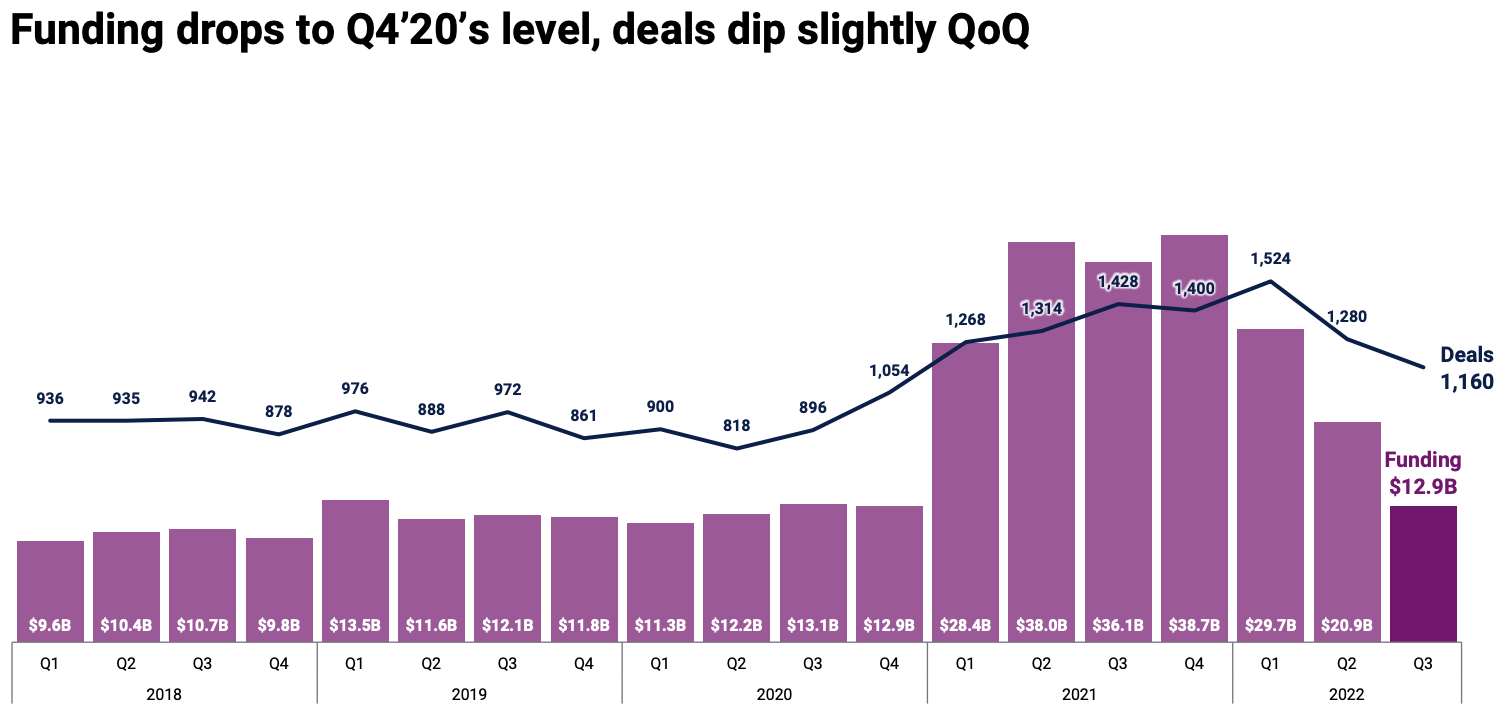
Global fintech funding by quarter, Source: State of Fintech Q3 2022, CB Insights
Looking at funding trends, data show that investments are moving to later stage rounds. Compared with previous years, seed funding accounted for a smaller proportion of all fintech venture capital (VC) funding in 2022, showcasing that Saudi Arabia’s fintech sector is maturing.
2022 also saw the first Series C round being secured by a Saudi Arabian fintech company when Foodics, an end-to-end cloud-based point of sale (POS) and restaurant management solution, raised US$170 million. The startup said it would use the proceeds to expand regionally and internationally, fund its mergers and acquisitions (M&A) strategy, as well as launch and scale new initiatives around fintech, micro-lending and supply chain management.
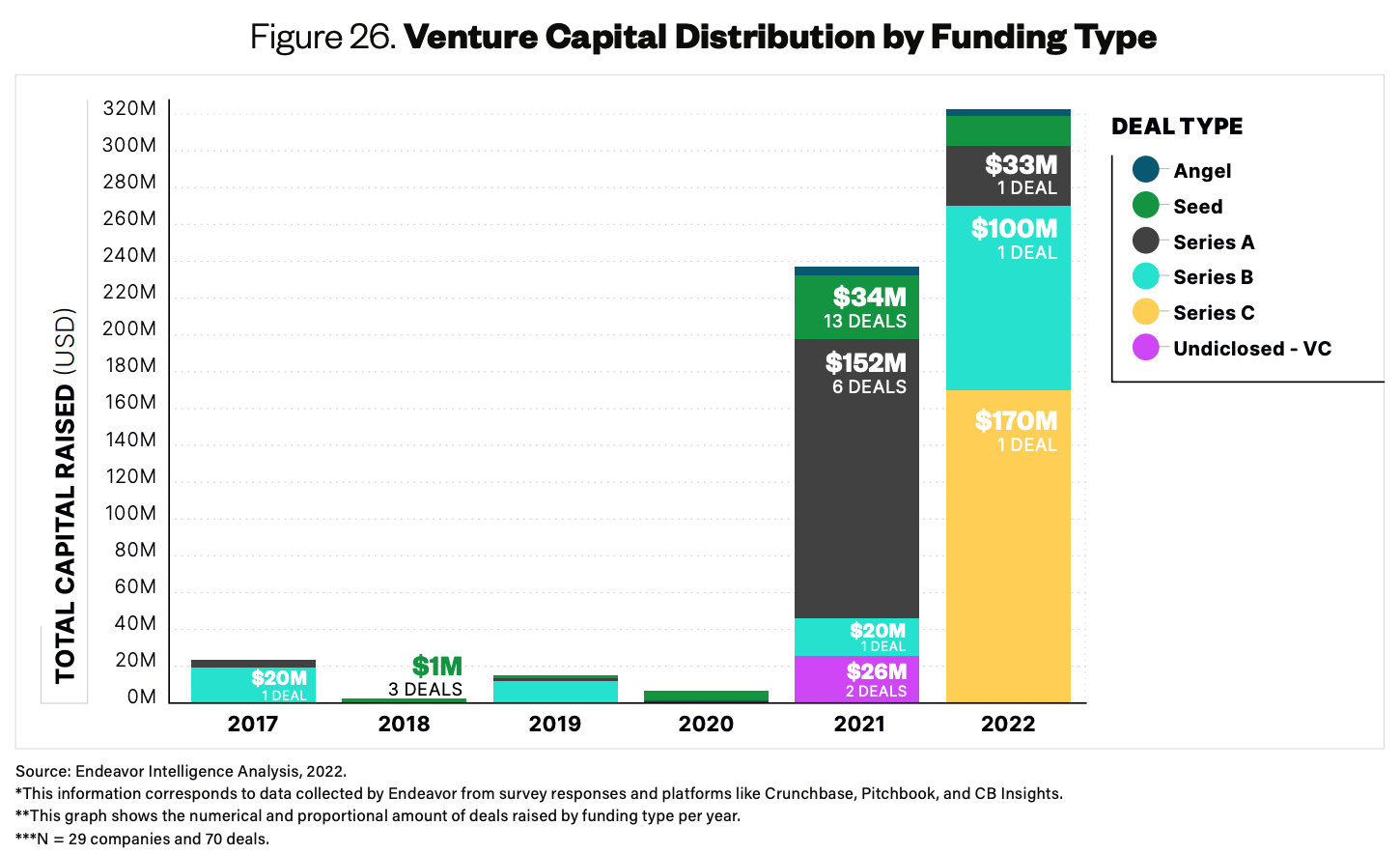
Saudi Arabia fintech venture capital distribution by funding type, Source: Industry Map: Fintech Ecosystem in Saudi Arabia, Endeavor, Nov 2022
The Endeavor analysis identified 100 fintech companies in Saudi Arabia as of 2022, a figure which represents 6.7x increase from 2014’s mere 15 startups.
The sector is rather diversified with several segments represented. Payments, however, remains the largest fintech category, accounting for 24% of all Saudi Arabian fintech companies. Payments is followed by enterprise financial management (14%), crowdfunding (14%) and lending (12%).
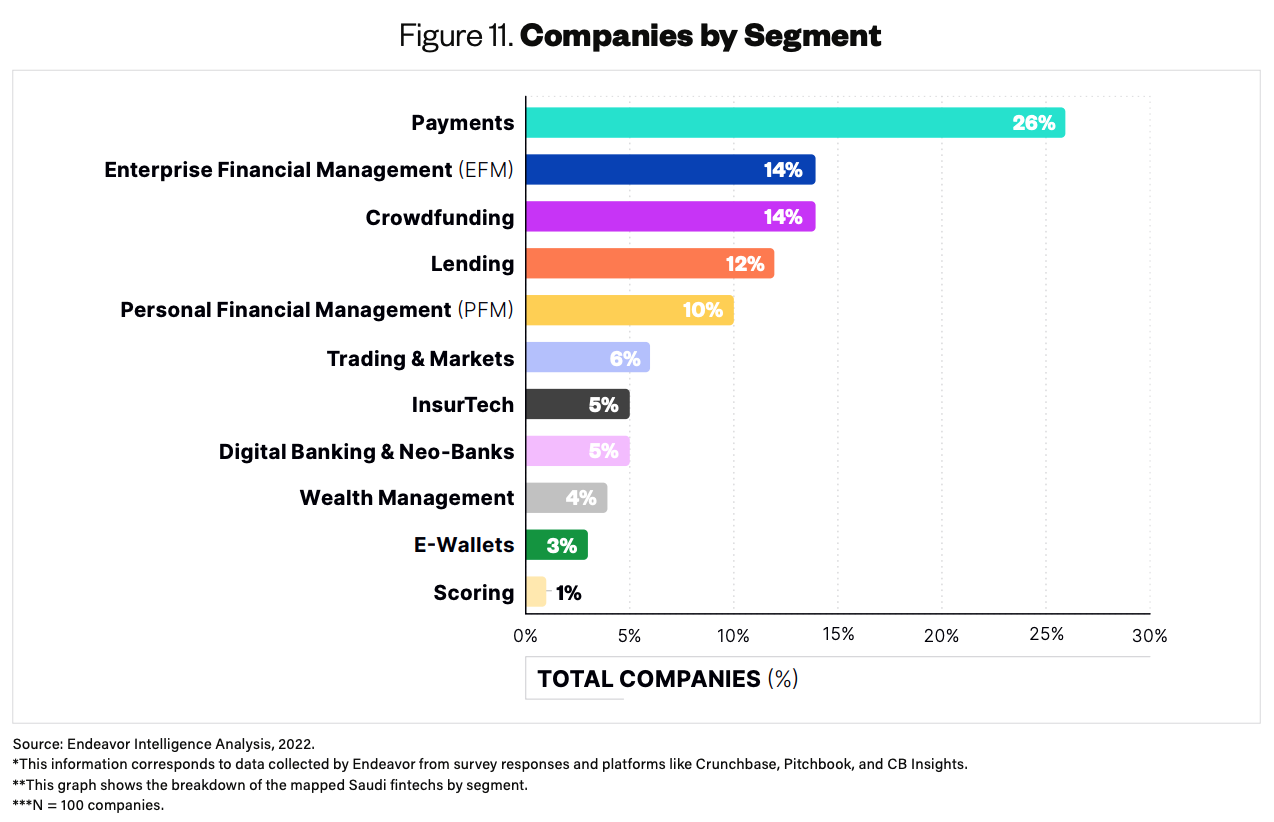
Saudi Arabia fintech companies by segment, Source: Industry Map: Fintech Ecosystem in Saudi Arabia, Endeavor, Nov 2022
Collectively, Saudi Arabia’s 100 fintech companies are responsible for creating more than 6,000 jobs, with 3,940 of these positions being introduced this year alone, the analysis found.
According to the report, employment is largely concentrated in 22 payment and lending companies that have managed to scale. These companies include Geidea, a digital payment providers and electronic payment systems developer; Foodics; Emkan Finance, a digital lending company; and Alhamrani Universal, a fintech solutions provider in the self-service banking industry.
These 22 companies represent 75% of all jobs in the Saudi Arabian fintech sector, amounting to about 4,700 employees.

Saudi Arabia’s largest fintech company by number of employees, Source: Industry Map: Fintech Ecosystem in Saudi Arabia, Endeavor, Nov 2022
While payments and lending lead in terms of absolute numbers of jobs created, the crowdfunding and digital banking verticals are actually the most active recruiters at the moment, the report says. Between 2020 and 2021, the two segments recorded the highest annual employee growth rates, which stood above 200%.
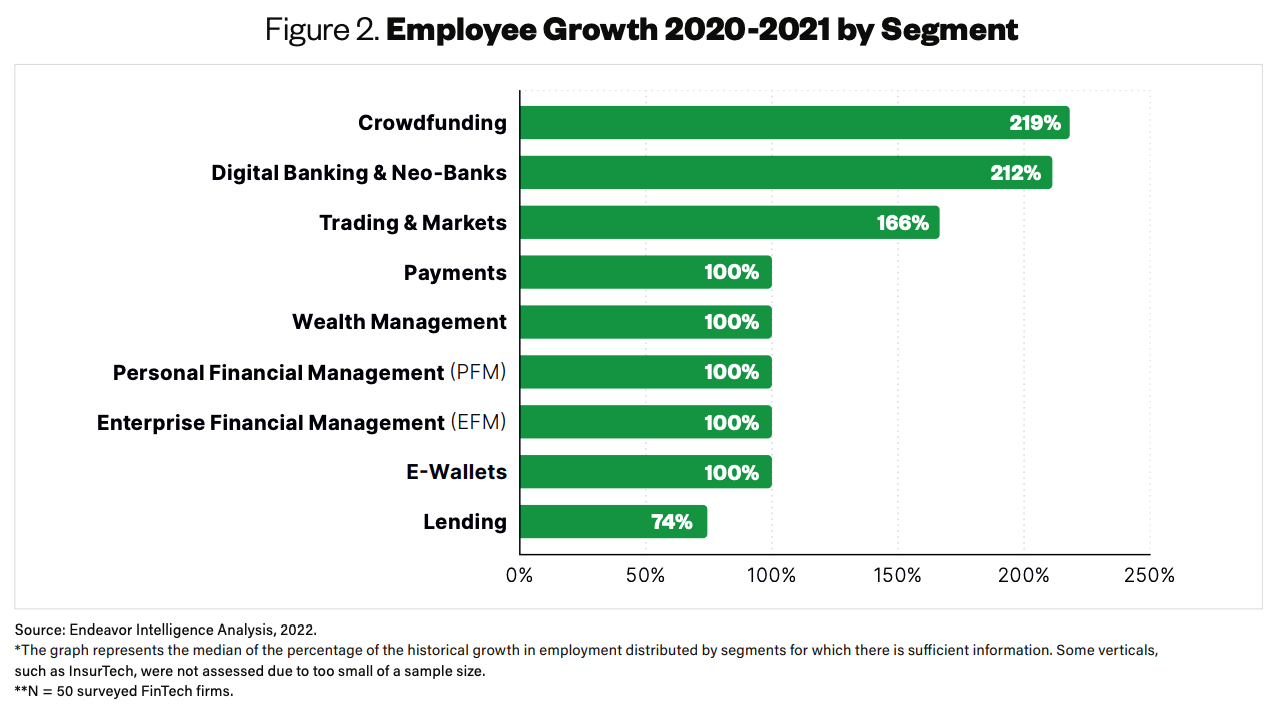
Employee growth 2020-2021 per fintech segment, Source: Industry Map: Fintech Ecosystem in Saudi Arabia, Endeavor, Nov 2022
The hiring spree in Saudi Arabia’s digital banking sector comes on the heels of the granting of digital banking licenses to new industry entrants. The three new licensees, which have yet to launch operations, are set to shake up the banking industry by providing customers with a larger range of options, widening financial access and driving innovation across the broader financial sector, said an earlier report by Fintech Saudi, a body introduced by the Saudi Arabian Monetary Authority (SAMA) to support the development of the local fintech ecosystem.
The Endeavor report highlights key drivers that have facilitated the growth of the fintech sector in Saudi Arabia, naming access the financing, market size and government support, as the country’s biggest strengths. However, it also acknowledges a number of challenges which have hampered domestic fintech entrepreneurs to grow and scale.
A survey of 50 local fintech companies conducted as part of the report found that the availability of tech talent and managerial talent is currently the biggest challenge faced by the sector, qualified as either “major” or “minor” obstacles by 83% and 86% of the respondents polled, respectively. The biggest gaps in talent are found in cybersecurity, product development, data science and analytics, software engineering, and compliance and legal.
After the talent shortage, cooperation with traditional financial entities and compliance with laws and regulations were found to be the second and third biggest challenge for fintech entrepreneurs, identified by 82% and 72% of respondents, respectively, as either “major” or “minor” obstacles.
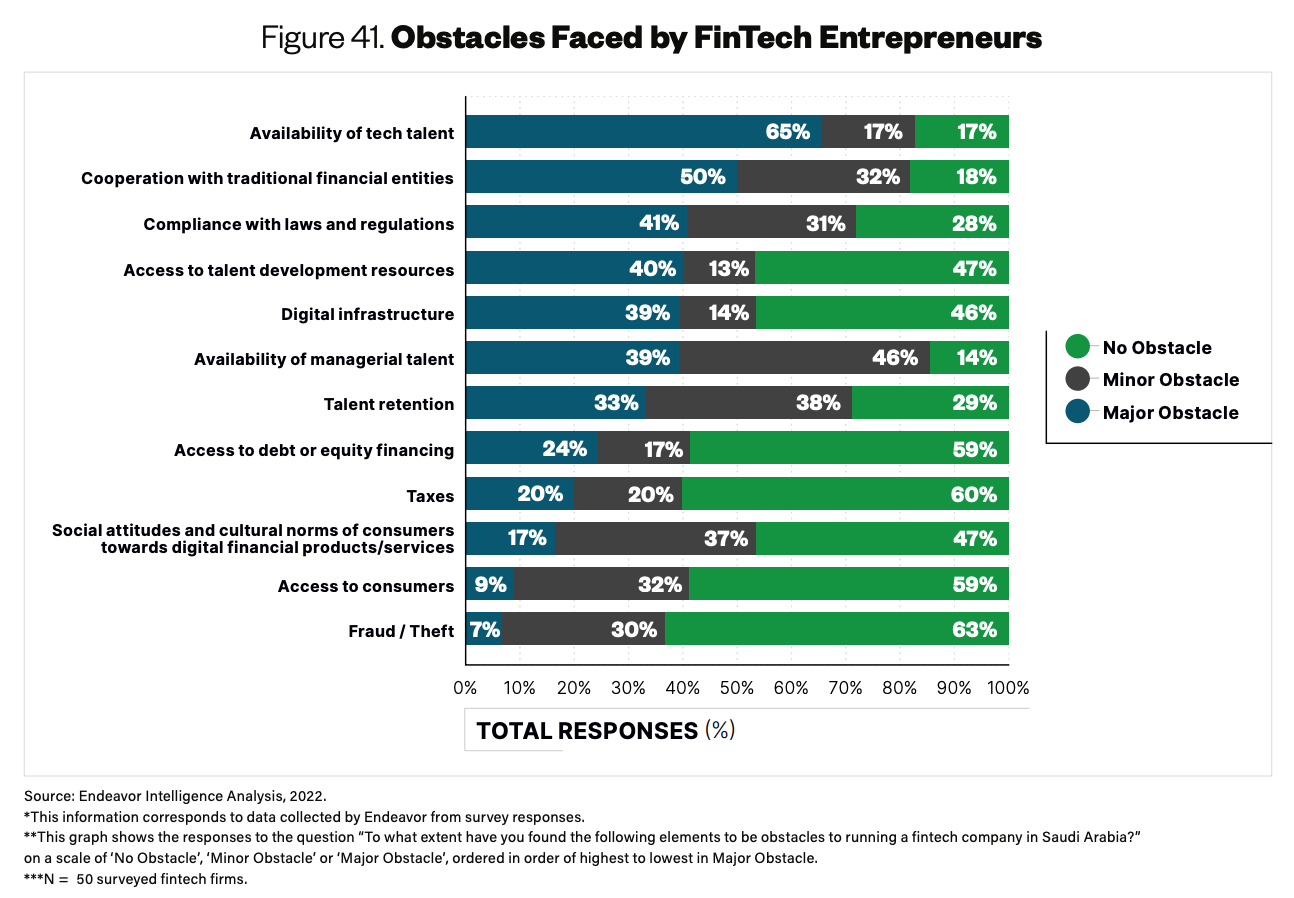
Obstacles faced by fintech entrepreneurs in Saudi Arabia, Source: Industry Map: Fintech Ecosystem in Saudi Arabia, Endeavor, Nov 2022








No Comments so far
Jump into a conversationNo Comments Yet!
You can be the one to start a conversation.